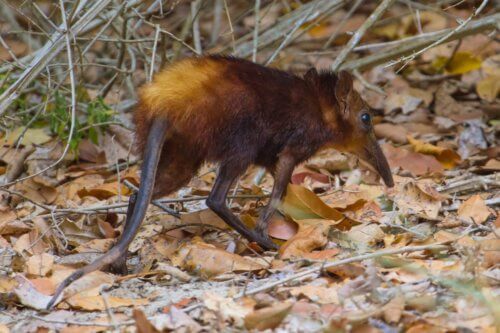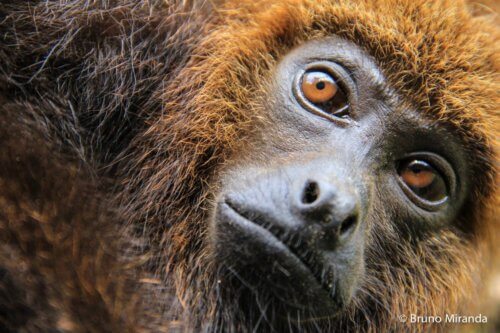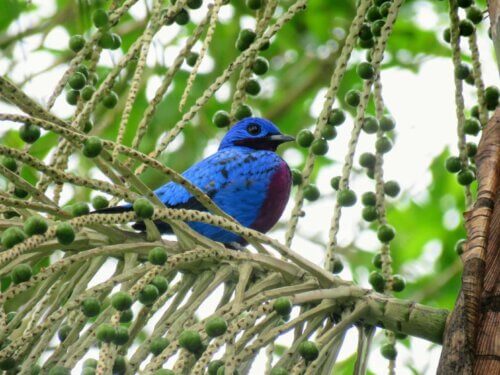Among the species that are in danger of extinction and live in the new areas that will become nature reserves: Clark's weaver, northern brown shag and other species of animals and plants

Continuing to save the world: For the fifth year in a row, members of the TiME organization have managed to raise money through crowdfunding to purchase an area of the world and turn it into a nature reserve, thus saving the species that live there and are in serious danger of extinction. This year the members of the organization managed to raise hundreds of thousands of dollars and for the first time they will purchase two areas: 2000 dunams of the Atlantic rainforest in Brazil and 800 dunams of the Dakcha forest in Kenya. The members of the organization, which is open to anyone of any age and anywhere in the world to join, will rescue dozens of species this year, including the Clark's weaver (whose last place on earth it nests is the Dakcha forest), the sukukka goat, the golden-tailed heron, the northern brown shag, and the golden capuchin Belly and dozens of other species of rare animals and plants that are in danger of extinction. "If until now we have been used to thinking that harming nature harms us, humans only through global warming, another face to the destruction of the environment has been revealed in the form of the corona epidemic which has taken a terrible economic, health and personal toll. There is no dispute among the researchers that the epidemic was caused by the damage to nature, and if we continue on the same path we are expected to experience more and even more destructive epidemics. In fact, the order of the hour today for the human race is to protect the natural areas - both to prevent epidemics and to deal with global warming, which we are currently experiencing the edge of their influence, but which will soon be reflected in serious and difficult events," said Prof. Uri Shains from the University of Haifa, the founder of "Time".
The organization TiME (This is My Earth) was founded five years ago by Prof. Shines from the Department of Biology and Environment of Haifa University in Oranim, who was joined by Prof. Alon Tal from Tel Aviv University, as an international democratic organization where every person of any age is invited to contribute according to his ability - Starting from one dollar - when everyone (regardless of the amount of the donation) has an equal voice in deciding where to purchase the next area, and 100% of the donations reach the goal of purchasing the areas and preserving them. Each year, the members of the organization, which currently has over 5,700 men, women and children from all over the world, are presented with three areas from around the world selected by the scientific committee, which operates like all the members and activists of the organization on a completely voluntary basis, and in which there is a wide variety of endangered species and the members choose one area that can be purchased and become a nature reserve.
As mentioned, this year the organization will purchase 2000 dunams from the Serra Bonita range in the Atlantic Rain Forest in Brazil, which is considered one of the most important areas in the world for conservation, for a sum of $140,000. A survey done in the area in the 90s of the 20th century found that one hectare (10 dunams) had 458 species of trees. Among the species that the members of the organization will save are two monkeys that are in serious danger of extinction: the Northern Brown Howler Monkey, and the Yellow-breasted Capuchin, as well as 27 species of birds in danger of extinction, among them the banded cotinga) which is in serious danger of extinction.

The money for the purchase of the area in Brazil was raised by the members of the organization before the end of 2020, and towards the end of the year they launched a campaign with the aim of raising enough money by the end of the year to purchase additional area. The campaign was successful and this year the organization will also purchase 800 dunams in the Dakcha forest in Kenya for the sum of $40,600. The forest serves as the last nesting ground in the world for the rare and endangered bird, Clarke's weaver. Among the other species that will benefit from the purchase can be found the Sokoke scops owl, the beautiful bird Fischer's tiuraco, the Golden-rumped Sengi, and rare plants such as Warburgia stolmani.
As part of the organization's principles, the territories do not remain in its ownership but are transferred to local organizations, in order to avoid a situation of "green colonialism". The new nature reserve that will be established in Brazil will be managed by Instituto Uiraçu, and in Kenya by Nature Kenya-The East Africa Natural History Society.
"As we mentioned when we started, 2.3% of the earth's surface is defined as a 'hot zone' where there is a rich biological diversity of animal and plant species that are in danger of extinction, therefore even the relatively small areas that we purchase can make a significant contribution to the protection of many species. For the fifth year now we have been proving that this method, which was initially perceived as naive, works and succeeds in changing a reality that according to every forecast - even the most optimistic - is quite bleak. We started as a small group, and after five years we manage to expand our activity - whether by purchasing more land, or by expanding the educational program outside the borders of the schools in Israel to that of Oregon in the United States and that of Rwanda in Africa. I invite more people to join us and take part in changing our reality on Earth", Prof. Shines concluded.

